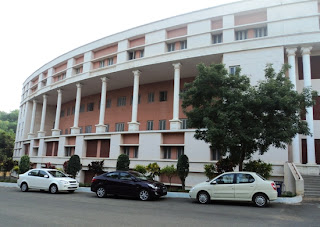IMPORTANT
FEATURES OF THE ECONOMIC SURVEY-2012-13
India’s Economic Survey 2012-13 has been released. Indian
economy is expected to achieve 5.0% growth rate having 5.5% and 5.3% in first
and second quarters respectively but the growth rate has fallen considerably
from 9.3% in 2010-11.Agricultural growth rate is realized at 3.6% as against of
4.0% target rate. The contribution of growth in
agriculture in GDP fell down massively. The foodgrain production in
million ton has come down from 259.32 in 2011-12 to 250.14 in 2012-13 but the
yield of foodgrains per kg/hectares has enhanced from 1930 in 2010-11 to 2059
in 2011-12.Gross capital formation in agriculture as a percentage of agri-GDP
has almost doubled in a decade and now hovers around 20% .Given capital output
ratio about 4:1,this should easity give us a growth of more than 4.5% ,but even
the dream of having a considerably 4% growth in agriculture still remains
elusive. In 2011-12,agri-exports touched $17 billion, against imports of only
$17billion ,in 2012-13,exports are likely to cross $40billion against imports
of roughly $20billion. The growth rate of manufacturing value added fell
considerably to 7.3% in 2012 including
fall of gross capital formation in
industry(-10.8%) from 22.3% in last year. Credit growth to manufacturing down
from 22.54% in Q1 to 14.83% by Q3.Over all, India’s manufacturing has stagnated
at around 15% of GDP.FDI in infrastructure sector down 79% to $1.2billion from
$5.8billion.The growth of Gross fixed capital formation of the economy has
fallen sharply from 14% in 2010-11 to 2.5% in 2012-13.The growth of Private
final consumption decreased from 8.6% in 2010-11 to 4.1% in 2012-13.Government
will not breach the fiscal deficit target of 5.3% of GDP despite shortfall in
revenues in the current fiscal year. Wholesale price index based inflation may
decline to 6.2% in March 2013.The gap between the CPI based inflation and WPI
inflation has widened due to high food inflation. The current account deficit
widened to 4.6% of GDP in Q1 of 2013.The bank credit to agriculture fell from
368616 cr in 2011-12 to 142832cr in 2012-13.Both the growth in deposits and
credit have fallen. The net injection/absorption of liquidity has increased too
by December2012.The NPA of the banking sector has gone too high. The FDI limit
in PSU banks could be increased to 26% as is the case with the insurance
sector. The export fell 5.5% and imports fell less than proportionately by
0.7%.The survey said that the government can curb demand through fiscal
consolidation and the RBI through that liquidity. These may have an adverse
effect on growth but that is inevitable. The Survey feels to invest more in education
and health sectors including in employment generation and financing in climate
change. The agenda of the survey
highlights in the manner of [i] no higher marginal rates of tax-broaden the tax
base to raise tax collections,[ii] cut subsidies, rationalize expenditure to
bring down the fiscal deficit,[iii] indirect nod to a large number of
differently sized banks, to support small and medium enterprises,[iv] improve
ease of doing business, expedite clearances,[v] further relax foreign direct
investment regime.Raghuram Rajan prescribed for the economy to revive growth
and rebalance national spending from consumption to investment by [i]
increasing government saving,[ii] incentivizing financial savings through real
high returns,[iii] removing bottlenecks to investment and job creation ,[iv]
reducing costs of raising finance, and [v] combating inflation through monetary
and supply side measures.The Deputy Chairman of the Planning
Commission,M.S.Aluwalia hoped that the projection of 6.7% growth for 2013-14 is
not optimistic by raising tax:GDP ratio.


